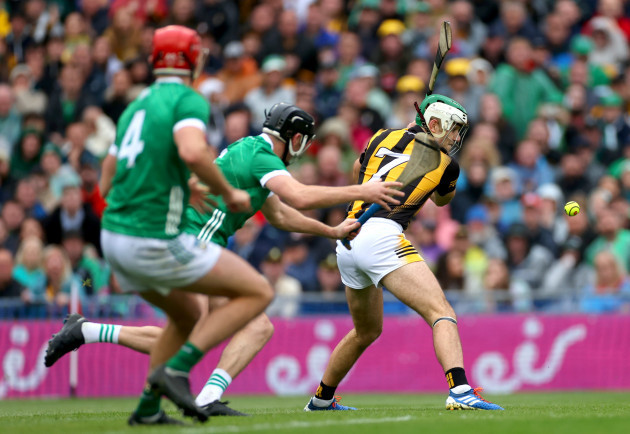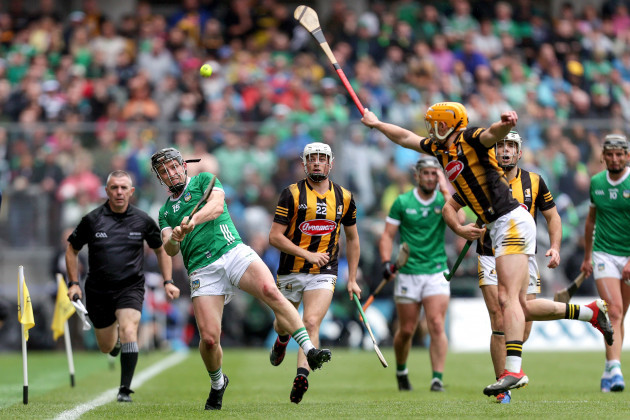I
The time required to win an All-Ireland final can vary.
It took Offaly the last seven minutes to do it in 1994. Wexford had to graft for something closer to the allowed maximum two years later. While 11 years after that, in 2007, Kilkenny wrapped up a second title in succession within 10 minutes of the ball being thrown in.
Although such matches run along an expected timeline with each incident informing the next passage of play, their outcomes tend to be more easily plotted in narrower periods.
Limerick hurling has known many ways to lose a final. Last Sunday, they demonstrated in a quarter of an hour or so the most clinical way in which a final can be won.
II
On one stave, for a small instrument, the man writes a whole world of the deepest thoughts and most powerful feelings. If I imagined that I could have created, even conceived the piece, I am quite certain that the excess of excitement and earth-shattering experience would have driven me out of my mind. If one doesn’t have the greatest violinist around, then it is well the most beautiful pleasure to simply listen to its sound in one’s mind.
-
A letter from Johannes Brahms to Clara Schumann
III
A chaconne is a musical composition. What so excited the German composer Brahms may be more easily understood as the Chaconne. Composed by Johann Sebastian Bach about 300 years ago, playing it remains the most transparent measure of excellence.
“Violinists consider it the most beautiful and unconquerable piece in our repertoire,” explains Natalie Hodges in her brilliant book, Uncommon Measure. “At any given point, wherever you are in your journey, the Chaconne represents the pinnacle of who you are and what you can do as a violinist.”
Taking its complexity as read, the most telling challenge of Bach’s Chaconne is the time it takes one to perform it. Unaccompanied, the soloist must navigate 15 minutes of music without faltering.
IV
If nobody was writing Limerick off when Paddy Deegan scored Kilkenny’s second goal in the 42nd minute of Sunday’s All-Ireland final, there weren’t many predicting what would unfurl in the 15 minutes or so that followed.
Deegan’s score had put his team five points clear and Limerick, despite their fancied position pre-match, looked vulnerable.
Much of the post-match analysis stressed the reliability – nay, the inevitability – of Limerick’s third quarter performance, yet Kilkenny had scored 1-1 to their opponents’ 0-2 seven minutes into the supposed kill-zone for challengers.
The speed of time does not alter during a game of hurling. Though our perception of it as watchers, and indeed players, can undergo phenomenal shifts in understanding throughout.
Ninety seconds after Deegan’s shot tore a hole in Nickie Quaid’s goal, Peter Casey scored Limerick’s third point of the second half. Points by Barry Nash, Gearoid Hegarty, Diarmuid Byrnes and Aaron Gillane followed and over the course of four minutes Limerick were level.
In a tenth of the amount of time they had taken to score 11 points, Limerick hit five without reply.
Each score demonstrated both Limerick’s reaction to the anxiety of possibly losing a game they knew should be won, and an assuredness that the most critical period of any game is what they make of it.
V
“Nobody serious underestimates how integral [Cian] Lynch is to the way Limerick operate,” wrote the Irish Examiner’s Maurice Brosnan following the final. In no sense is that assessment more fitting than in the consideration of Lynch’s relationship with time.
How frustrating it must have been for him as months built upon months and injuries hampered his effectiveness. Even in a Limerick team that requires minutes to destabilise opponents, Lynch does his most devastating work in an even tighter time-frame.
Following Casey’s first point in the five-score run, Lynch brought the resulting breaking ball from Eoin Murphy’s puck-out to hand, turned the long way around Billy Ryan and popped off a hand-pass to Casey that found its way to Nash who struck it over the bar.
He had possession of the sliotar for all of three seconds and there was no wasted action in anything he did. Within a minute-and-a-half, with Limerick still trailing by two points, a safe hand pass from Tom Morrissey appeared to catch Lynch unawares and the sliotar bounced up overhead.
Almost instantaneously, Lynch reached out his hurl and cushioned the ball back down into Darragh O’Donovan’s path. Holding off the closest Kilkenny player with his body, Lynch made space for his teammate to raise the sliotar and earn a free that Byrnes would convert to reduce the deficit to one point.
Again, it was magisterial skill in the slightly extended blink of an eye.
VII
“The technical difficulty is nothing compared to the emotional and physical stamina required just to get through those 15 unrelenting minutes,” writes Hodges of Bach’s Chaconne. “You’re alone, exposed”.
As a prescribed piece of music, the Chaconne is generally reserved until the violinist is thought capable of performing it. Alternatively, it becomes a testing ground upon which one cruelly discovers that they never had what it took to be an expert soloist at all.
However competently one can work through the chord progressions, while possibly handling the relentlessness of its timing, there remains a broader challenge of simply knowing what it is that you are dealing with that persistently trips people up.
It is a sensation Hodges traces back to the composer himself.
“His music is just not about him, somehow,” she explains, noting the grander religious themes which informed Bach’s work. “He removed his ego from his music so that he might make a worthy offering.”
VIII
For all that Limerick’s five-point run levelled Sunday’s game, their next five were broken up by three points of Kilkenny’s own. Objectively, this two-point deficit with a decent chunk of normal time remaining might not have seemed so unappealing to Kilkenny at 3.30pm.
Indeed, after John Donnelly gave Kilkenny that platform to build upon with his point in the 57th minute, both teams traded scores to ensure the gap remained two points right on the precipice of what has been labelled here as Limerick’s quarter-of-an-hour All-Ireland success.
It might seem churlish, or a touch convenient, to suggest that Kilkenny were beaten when Peter Casey hit his second point of the game shortly thereafter, but context is key.
To level the game initially about seven minutes earlier, Aaron Gillane had received a pass from Seamus Flanagan only a few feet from the sideline beside the Cusack Stand. Later that evening on The Sunday Game the panelists would highlight Limerick’s remarkable doggedness leading up to Gillane’s shot as indicative of the onslaught that would follow.
Of the shot itself, however, Gillane’s keen ability to find space and receive Flanagan’s pass did not necessarily leave him in an optimal position to score. An onrushing Kilkenny defender left him practically no room to weigh up the angle. Yet, once again, the critical ability of a Limerick hurler to execute something incredibly difficult in barely any time at all, without any hindrance of thought for what a miscued effort might allow Kilkenny to do, gave Gillane’s shot flight.
Arching his back ever so slightly, Gillane adjusted his balance and fired the sliotar over his opponent – and almost over the netting behind the goal itself – to find an instant solution for this dilemma.
Casey’s critical point just before the hour followed a similar pattern.
From a somewhat careless Kilkenny sideline ball, Casey retrieved the sliotar and ran with it. Almost exactly where Gillane had been standing but beneath the Hogan Stand, Casey was met by a Kilkenny defender who seemed destined to usher the Limerick forward out of play.
Instead, Casey managed to find room for a shot which carried straight over the bar. Although by the standards of modern hurling it was not a score that is entirely uncommon, the speed at which it was executed seemed startling – about five seconds elapsed between Casey grabbing the ball on the half-way line and the point being awarded.
“In the middle of the Chaconne, there is a pause that lasts for less than the space of a breath and yet, somehow, for an eternity,” notes Hodges. A similar sensation surrounded this series of Limerick points.
“Alone, exposed,” Casey’s score rubber-stamped an almost casual nature to Limerick’s brilliance that left Kilkenny looking thoroughly out of their depth.
IX
Fifteen minutes is more than enough to win an All-Ireland final. On Sunday, it was what Limerick required, however.
Although we can examine that period of time in its smaller series of events, one need only consider its totality to understood how it came to fruition almost without Kilkenny’s knowing.
Derek Lyng and his team will have been aware that the third quarter of Sunday’s game could have a bearing on the end result. And while Kilkenny were not beaten by the 52nd or 53rd minute of the final, they would play no meaningful part in the game beyond the hour mark.
It must be a curious sensation, knowing what dangers lie ahead, presumably believing that you have a plan and the ability to counter it, but being overcome by that threat all the same.
“The Chaconne ends the way it begins,” explains Hodges. “That simultaneity of end and beginning gives the impression, at least to me, that the entire Chaconne has unfolded within a single moment.”
Limerick have demonstrated their own ability to begin and end the winning of an All-Ireland final exactly as one expects them to do; the only trace of its occurrence emerging when it is already too late.
They have become, and may for some time remain, “the most beautiful and unconquerable” team in hurling.



